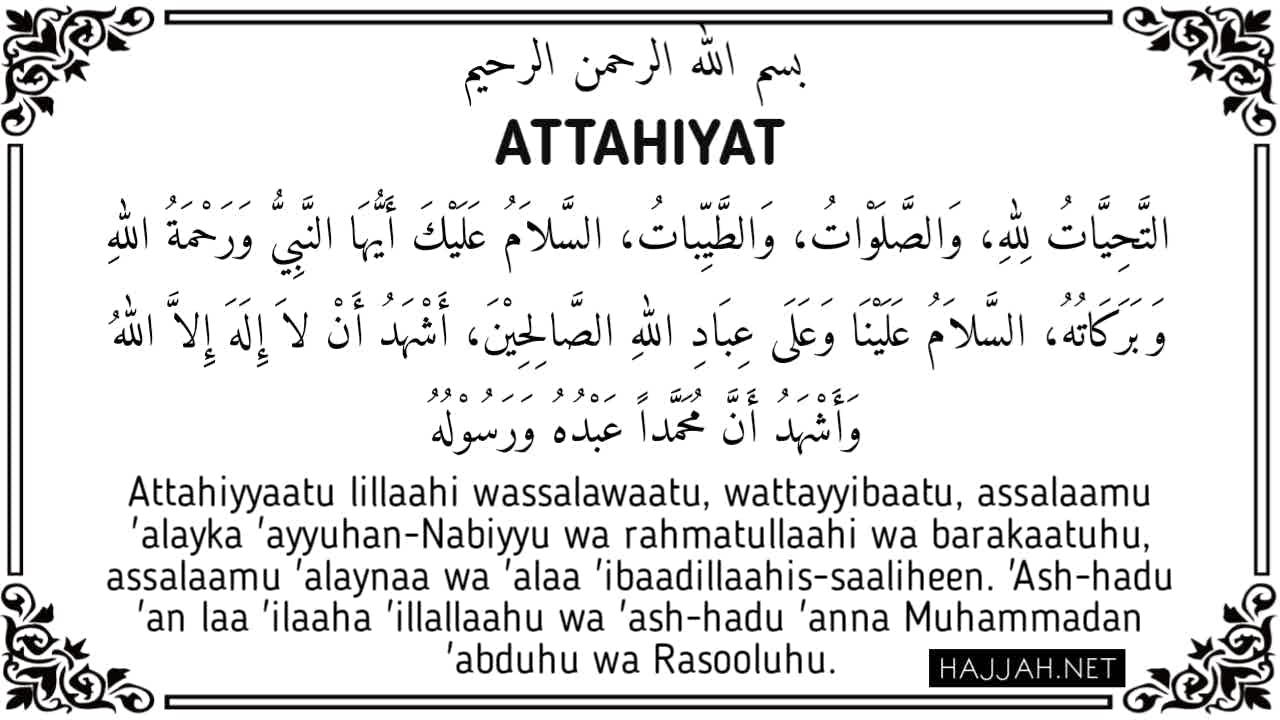Assalamualaikum muslim brother, in prayer there are readings that become the pillars of prayer, one of which is attahiya. On this occasion we will share a complete attahiyat reading in Arabic English translation and transliteration. So keep reading this article till it’s finished.
What Is Attahiyat?
Attahiyat Dua Or Tashahhud
Images
Arabic
Transliteration
Attahiyyaatu lillaahi wassalawaatu, wattayyibaatu, assalaamu ‘alayka ‘ayyuhan-Nabiyyu wa rahmatullaahi wa barakaatuhu, assalaamu ‘alaynaa wa ‘alaa ‘ibaadillaahis-saaliheen. ‘Ash-hadu ‘an laa ‘ilaaha ‘illallaahu wa ‘ash-hadu ‘anna Muhammadan ‘abduhu wa Rasooluhu.
English Translation
All greetings or salutation are for Allah, and all prayers and goodness. Peace be upon you, O Prophet, and the mercy of Allah and His blessings. Peace be upon us and upon the righteous slaves of Allah. I bear witness that there is none worthy of worship but Allah, and I bear witness that Muhammad is His slave and His Messenger.
Attahiyat Hadith
- Narrated Ibn Mas`ud: Allah’s Messenger (ﷺ) taught me the Tashahhud as he taught me a Surah from the Qur’an, while my hand was between his hands. (Tashahhud was) all the best compliments and the prayers and the good things are for Allah. Peace and Allah’s Mercy and Blessings be on you, O Prophet! Peace be on us and on the pious slaves of Allah, I testify that none has the right to be worshipped but Allah, and I also testify that Muhammad is Allah’s slave and His Apostle. (We used to recite this in the prayer) during the lifetime of the Prophet (ﷺ) , but when he had died, we used to say, “Peace be upon the Prophet.” Sahih al-Bukhari 6265 {Sahih}
- Abdullah (b. Mas`ud) said: While observing prayer behind the Messenger of Allah (ﷺ) we used to recite: Peace be upon Allah, peace be upon so and so. One day the Messenger of Allah (ﷺ) said to us: Verily Allah is Himself Peace. When any one of you sits during the prayer, he should say: All services rendered by words, by acts of worship, and all good things are due to Allah. Peace be upon you, O Prophet, and Allah’s mercy and blessings. Peace be upon us and upon Allah’s upright servants, for when he says this it reaches every upright servant in the heavens and the earth. (And say further): I testify that there is no god but Allah and I testify that Muhammad is His servant and Messenger. Then he may choose any supplication which pleases him and offer it.Sahih Muslim 402 a {Sahih}
- Abdullah b. Zubair narrated on the authority of his father that when the Messenger of Allah (ﷺ) sat for supplication, i. e. tashahhud (blessing and supplication), he placed his right hand on his right thigh and his left hand on his left thigh, and pointed with his forefinger, and placed his thumb on his (milddle) finger, and covered his knee with the palm of his left hand.Sahih Muslim 579 b {Sahih}
- Yahya related to me from Malik from Nafi that Abdullah ibn Umar used to say the tashahhud saying, “In the name of Allah. Greetings belong to Allah. Prayers belong to Allah. Pure actions belong to Allah. Peace be on the Prophet and the mercy of Allah and His blessings. Peace be on us and on the slaves of Allah who are salihun. I testify that there is no god except Allah. I testify that Muhammad is the Messenger of Allah.” “Bismillah, at-tahiyatu lillah, as-salawatu lillah, az-zakiyatu lillah. As-salamu ala’n-nabiyyi wa rahmatullahi wa barakatuhu. As-salamu alayna wa ala ibadi’llahi’s-salihin. Shahidtu an la ilaha illallah. Shahidtu anna Muhammadu’r-rasulu’llah.” He used to say this after the first two rakas and he would make supplication with whatever seemed fit to him when the tashahhud was completed. When he sat at the end of the prayer, he did the tashahhud in a similar manner, except that after the tashahhud he made supplication with whatever seemed fit to him. When he had completed the tashahhud and intended to say the taslim, he said, “Peace be on the Prophet and His mercy and blessings. Peace be upon us and on the slaves of Allah who are salihun.” “As-salamu ala’n-nabiyyi wa rahmatu’llahi wa barakatuhu. As-salamu alayna wa ala ibadi’llahi’ssalihin .” He then said, “Peace be upon you” to his right, and would return the greeting to the imam, and if anyone said “Peace be upon you” from his left he would return the greeting to him.[Imam Malik’s Muwatta]
- Narrated/Authority of Jabir bin Abdullah:”The Messenger of Allah (saw) used to teach us the Tashahhud as he used to teach us a Surah from the Quran: ‘Bismillahi wa Billahi; at-tahiyyatu lillahi was-salawatu wat-tayyibatu lillahi lillahi; as-salamu ‘alayka ayyuhan-Nabiyyu wa rahmatullahi wa barakatuhu; as-salamu ‘alayna wa ‘ala ‘ibadillahis-salihin. Ashhadu an la ilaha illallah wa ashhadu anna Muhammadan ‘abduhu wa rasuluhu. As’alu Allahal-jannah, wa a’udhu billahi minannar (In the name of Allah and by the grace of Allah. All compliments are due to Allah and all prayers and good words are due to Allah. Peace be upon you, O Prophet, and the mercy of Allah and His blessings; peace be upon us and upon the righteous slaves of Allah. I bear witness that none has the right to be worshipped but Allah and I bear witness that Muhammad (SAW) is His slave and Messenger. I ask Allah for Paradise and I seek refuge with Allah from the Fire).'” [Tashahhud][Sunan Ibn Majah]
That’s the explanation of attahiyat that we can share, hopefully with this article you can be helped. Finally, may we always be able to carry out worship correctly and our worship will be accepted by Allah SWT.
Also Read


.jpg)










